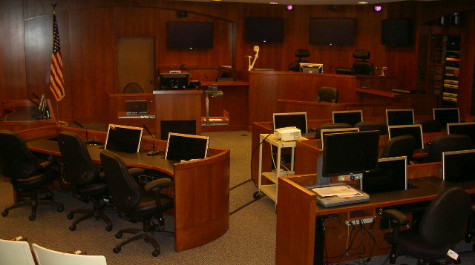Fred Lederer Brings Innovation, Technology to Courtroom and Classroom
Professor Fredric Lederer can trace his interest in technology all the way back to his childhood – and his terrible handwriting. “In elementary school I realized my handwriting was atrocious, so I learned to type very quickly and in later years graduated to one of the first portable computers,” he recalls. “I also had an interest in science fiction technology.”
The combined interest in computers and science fiction led him to explore how our legal system responds to sudden change, which is often the result of technology. “I've always been fascinated by what technology can do both for good and for ill,” notes Lederer.
In Lederer’s 30 years at William & Mary, he has overseen changes to the technological capacity of the school and its courtroom in particular. “When I was first hired,” says Lederer, “one of the principal reasons was so I could create a new trial advocacy program that would use the capabilities of our new, technology-augmented courtroom. The 1980 high tech wonder had small televisions for the jurors and a camera to display evidence. Then in 1993, the Stenograph Corporation, which manufactures courtroom reporting equipment, wanted to create a computer integrated courtroom that included a video recording system using multi-frame television and a real time court reporter-based court record system. They provided the hardware and the funding and added the capabilities to our courtroom. That’s also when Martin Gruen, the Deputy Director of the Center for Legal and Court Technology, became involved.”
"Fred has done a marvelous job over the course of his William & Mary career improving the technological capabilities of the law school and serving as the driving force behind the creation of one of the most remarkable courtrooms in the world," says Law School Dean Davison M. Douglas. "Fred is an amazingly creative entrepreneur, and by the sheer force of his will, he has built the most technologically sophisticated courtroom in the world. When I travel internationally, and mention to a lawyer or legal academic that I am from William & Mary Law School, a typical response is, 'Oh, I know all about your law school's high-tech courtroom.’ Fred has really helped place our law school on the map throughout the world."
In the summer of 2009, the McGlothlin Courtroom underwent a major renovation process that essentially rebuilt it from the ground up. Almost $1.5 million dollars of technology and millwork was supplied by CLCT participating companies. The courtroom is named in memory of B. F. McGlothlin, Sr., and Annie L. McGlothlin, in recognition of a gift made to the Law School in 1990 by their son Woodrow McGlothlin, grandsons James W. McGlothlin and Nicholas D. Street, and The United Co. of Bristol, Virginia. James W. McGlothlin, a 1962 graduate of the College of William & Mary and a 1964 graduate of the Law School, is Chairman and CEO of The United Company and is an emeritus member of William & Mary's Board of Visitors.
Today, the courtroom employs roughly 20 full and part time staff, as well as approximately 40 law students. “We started out fairly courtroom-centric,” says Lederer. “Now we are involved all over the world, and courtrooms are only part of what we deal with. We teach an increasing number of technology related courses, offer consulting services, and train court staff from around the world.”
Lederer brings his commitment to law and technology to bear on his teaching and interactions with students as well. “Fred's work with the CLCT was informed by more than just an intellectual interest in the intersection between technology and the law,” recalls Erin McNeill, ’09, a litigation associate with the Risk Management practice group of Sands Anderson in Richmond, VA. “He has a real passion for discovering ways to use developments in science and technology to be more effective in trial advocacy, court administration, and continuing legal education. Fred's greatest strength is taking a tool -- like online learning or content delivery technology -- and recognizing opportunities to apply it more broadly.”
The technological capabilities of the courtroom were recently put to the test in the CLCT’s annual Lab Trial. CLCT Lab Trials are experiments that test the innovative use of technology to help resolve legal disputes. This year’s criminal trial was designed to test the degree to which it may be possible to fabricate digital evidence and how well jurors can understand computer experts.
“Our Lab Trial was a terrific success this year,” says Lederer. “We are still evaluating and conducting statistical analysis of the jury data. We did jury questionnaires both pre-trial and post-trial that should tell us an enormous amount about how juries interpret and understand technological information. Interestingly, the jury turned out to be far more technologically knowledgeable than we expected.”
In addition to his myriad contributions to the law school, Lederer is also an inspiring teacher and supervisor. “Working for CLCT gave me the opportunity to be more than just a student researcher,” says McNeill, “but a truly valued colleague and team member, even before graduation. Fred also became a cherished mentor. I am better at managing a litigation team because of the example he set at CLCT.”
The achievements of the courtroom and the CLCT are attributable to the dynamic combination of Lederer's leadership and the exceptional people who comprise the staff. “We’re not aware of anyone else in the world who does what we do here,” notes Lederer. “What makes us great is the extraordinary staff, including the incredible students with whom we work. My colleagues, especially Martin Gruen, are inspirations.”
